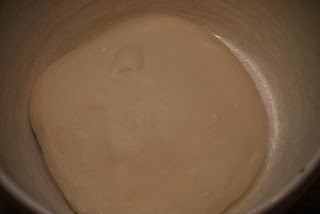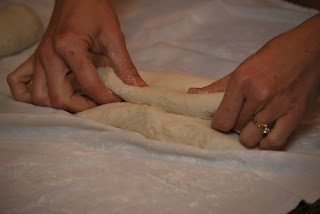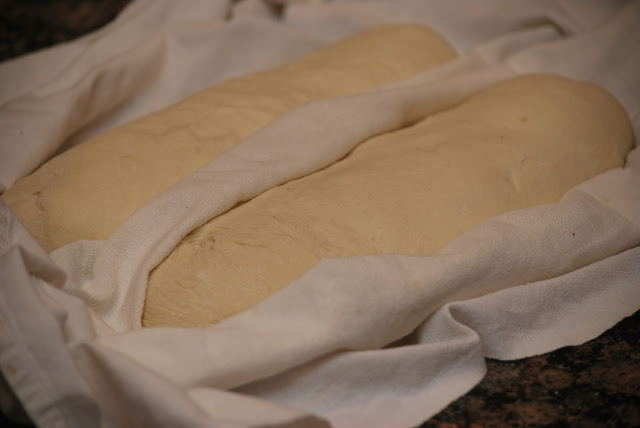I think that I was born to be a bread maker. I love absolutely everything about bread making. I love the chemistry that takes place between the ingredients. I love the feel of the soft dough as I knead it with my hands. I love the pillowy rise that it gets while it rises on the countertop. I love the smell of baking bread lofting through the house. I love the feel of a warm loaf of bread just out of the oven. I love the sound of a serrated knife slicing through the buttery crust of a freshly baked loaf of bread. I love eating that first slice of a loaf of bread - without butter - just pure and simple. Have I mentioned just how much I love bread?

This recipe came from a great Thomas Keller cookbook. It is a fabulous cookbook with awesome pictures.
Oh and one more thing that I love about bread - I love taking pictures of beautiful loaves of bread as well. (As you're about to see.)
Batard
Poolish
1 cup + 1 3/4 teaspoons flour
1/32 teaspoon instant yeast
1/2 cup + 1 Tablespoon + 2 1/2 teaspoons water (75 degrees)
Combine flour and yeast in a medium bowl. Pour in the water and continue to mix until thoroughly combined. The mixture should have the consistency of pancake batter.
Cover the bowl loosely with plastic wrap and let sit at room temperature for 12-15 hours.
The poolish will be bubbly and the lines on the surface will look like cracks that are beginning to fall in at the center.
Dough
3 cups + 2 Tablespoons flour
1/4 teaspoon instant yeast
1 cup + 3 1/2 Tablespoons water (75 degrees)
2 teaspoons fine sea salt

Place flour and yeast in bowl of a stand mixer.

Pour half of the water around the edges of the poolish to help release it.

Add poolish and remaining water to the bowl. Mix on low speed for 3 minutes with a dough hook.
Sprinkle salt over dough and mix on low for 20 minutes.
Turn dough out onto a lightly floured surface. (Do not flour the top.)
The dough will be very sticky.
Pat dough into a rectangle.
Stretch the left side of the dough upward and outward and fold it over two thirds of the dough.
Stretch and fold the dough from the right side to the opposite side.
Repeat the process working from the bottom and then the top.
Lift the dough from the surface and place seam side down in a greased bowl.

Cover the bowl with plastic wrap and let sit at room temperature for 1 hour.
Remove the dough from the bowl and stretch and fold it just like before.
Gently return it to the bowl, cover and let sit 1 hour longer.
Remove the dough from the bowl. Pat, stretch and fold it as before.

Spread a linen cloth on the counter and flour it lightly.

Turn the dough out onto the cloth. Gently pat the dough into a rectangle shape.

Divide dough into 2 equal pieces.
Gently fold the edges of each piece of dough in the center to form a ball. Turn seam side down on the board. Let rest for 15 minutes.
Using the sides of your hands, lift up the bottom of the dough and fold it over two thirds of the dough.
With your hands one of top and the other on the center of the dough, rock the dough back and forth applying gentle pressure while slowly moving moving your hands apart, until you reach the ends. As you roll the dough, it will increase in length and the structure will tighten. The finished diameter of the center of the batard should be 2 3/4 inches.
Lay the loaves on a floured cloth. Bunch the sides of the cloth to create small walls on both sides of the each loaf to help maintain the shape of the dough as it proofs.
Cover the dough with a plastic tub and let proof for 1 hour. Preheat oven to 460 degrees.
Move the dough, 1 piece at a time to a silpat lined baking sheet.

Score each batard by making a single cut own the center.

Transfer dough to the baking stone and bake 25 minutes 460.
Let cool completely on a cooling rack.
The bread will continue to cook as it cools so as tempting as it may be, let the bread cool to room temperature before slicing it.



I realize the the length of this blog alone is intimidating to most people. I promise you that it really isn't that hard. I simply wanted to add enough pictures to give you a visual reference to follow when you make bread at home. If you have never tried to make your own bread, you really need to give it a try. It is incredibly rewarding.
Ciao!




























































No comments:
Post a Comment